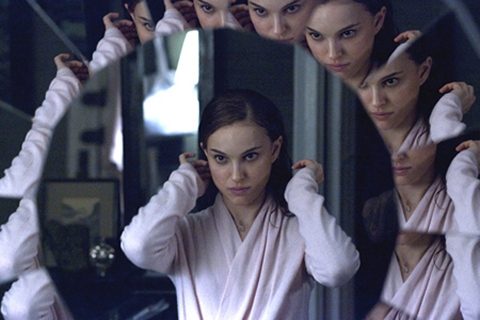When I sat down to write the review for Black Swan, I was ready to pluck it apart, feather by feather, ugly-duckling puns et all, and reveal it as the gigantic turkey it really is (because clearly my opinion is just as important, if not MORE SO, than Roger Ebert’s or Mark Kermode’s). Then I had an epiphany of sorts. I’m not saying it’s the best film ever made, or even of the past year, but it’s definitely worth a watch.
 Nina Sears (Natalie Portman) is a naive dancer who spends every waking hour honing her toe-points and pirouettes in the hopes of becoming a prima ballerina before her age catches up with her – mid-twenties in the ballet world might as well be O.A.P status. When she lands the lead role in Tchaikovsky’s seminal ballet “Swan Lake”, a role which demands both the virginal innocence of the White Swan and the sexual abandon of the Black Swan, the young perfectionist struggles to maintain the balance between reality and performance. Nina descends into a world of paranoia and fantasy spurred on by the bullying instruction and sexual advances of the play’s artistic director Thomas (Vincent Cassel), the competition of rival ballerina Lily (Mila Kunis) and the suffocating dominance of her washed-up dancer mother (Barbara Hershey).
Nina Sears (Natalie Portman) is a naive dancer who spends every waking hour honing her toe-points and pirouettes in the hopes of becoming a prima ballerina before her age catches up with her – mid-twenties in the ballet world might as well be O.A.P status. When she lands the lead role in Tchaikovsky’s seminal ballet “Swan Lake”, a role which demands both the virginal innocence of the White Swan and the sexual abandon of the Black Swan, the young perfectionist struggles to maintain the balance between reality and performance. Nina descends into a world of paranoia and fantasy spurred on by the bullying instruction and sexual advances of the play’s artistic director Thomas (Vincent Cassel), the competition of rival ballerina Lily (Mila Kunis) and the suffocating dominance of her washed-up dancer mother (Barbara Hershey).
Directed by Darren Aronfsky, Black Swan exists very much as a companion piece to his last award-winning effort The Wrestler, with both films’ focusing on the power and limitations of the human body and the inverted effect this has on the psychological condition. The idea of doppelgangers features thusly throughout the film, a constant reflection of Nnina’s fragmented mentality and lose grip on her own identity. As she envisions complete strangers as mirror images of herself, we see the Nina’s fears of being replaced manifest themselves onto the face of others – everyone is a disabling threat to her, none more so than herself. For as technically talented as Nina may be, what she lacks is the naturalistic sensuality that the Black Swan sorely needs. Nina is unable to break free from technique and “lose herself”, making her own ambition her biggest enemy and debilitating constraint.
My biggest issue upon leaving the cinema was a general feeling of nothingness. The characters felt mostly flat, none more so than Nina, who whimpers her way through the first two acts before flipping like a pancake and going all Kathy Bates in Misery. But it is in the film’s deliberate dichotomy of black and white, good and bad, sane and off-the-wall crazy that we are expected to make sense of Aronfsky’s melodramatic world. Viewing everything and everyone through Nina’s delirious eyes, there is no grey area – only failure and success. Thomas is the largely lecherous man in charge who Nina has to impress despite his grotesqueness, while Lily becomes the villainous, sexually depraved adversary whose genuinely good-natured gestures are tainted with doubt.
The film risks slipping into parody on many occasions (mostly when Cassel battles with the theatrical script) but is held together only just by the performances of its female stars. Portman has received raves for her portrayal of the brittle/feverish Nina, hotly tipped for an Oscar, although some could argue the role is more physically challenging than emotionally. Kunis also impresses as Lily, giving depth to a role that could have become pantomime given the limited development her character undergoes.
Black Swan is due a viewing more so for its ideas and its genre-mashing than the way in which it pulls them off – it dips its toe into the vast ocean of body-horror, but never quite pushes it far enough, while the psychological elements feel somewhat half-baked. Nonetheless, it has a glittering aesthetic that few other films can boast and offers 108 minutes of guiltless razzle-dazzle dressed as high art.




